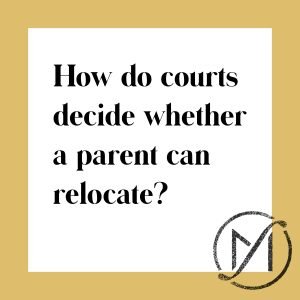How Do Connecticut Courts Decide Whether a Parent Can Relocate Post Divorce?

Updated December 16, 2023
When we are analyzing how best to help Freed Marcroft’s clients understand how Connecticut courts decide whether a parent can relocate post divorce, our first step is to review the initial court order.
Often the court’s orders in the parenting plan set out where and when a parent can move. If a parent’s proposed move falls within those parameters, you may not have to return to court. Suppose, in a litigated divorce, it does not fall within the current parenting plan. In that case, the parent who wants to move away may have to file a post judgment modification of the existing custody order to request permission for the move and an adjusted parenting plan. The parent who is staying put can also file seeking to prevent the other parent from taking the kids and going. If you’d prefer to reach an agreement rather than litigate, mediation and collaborative law are options to consider. In most cases, your attorney will submit the agreement you reach to the court so that the judge can make it an enforceable court order.
When Does a Relocation Substantially Impact the Parenting Plan?
Section 46b-56d of the Connecticut statutes explains that the family court must first determine whether the move would have a substantial impact on the existing parenting plan. This is quite dependent on both the current living situation and the existing plan. For example, a move to a new house in the same town might not affect most parenting plans where the child didn’t have to change schools. Alternatively, even a move from one end of Connecticut to the other might not impact the existing parenting plan when the other parent lives internationally. However, a parenting plan could be substantially impacted if the two parents live in the same neighborhood and one parent hopes to move out of state.
What is the Connecticut Legal Standard to Relocate with Children Post Divorce?
Suppose the court finds that the existing parenting arrangement would be significantly affected by the proposed relocation. In that case, the statute says that the relocating parent must prove that “(1) the relocation is for a legitimate purpose, (2) the proposed location is reasonable in light of such purpose, and (3) the relocation is in the best interests of the child.”
Legitimate Purpose
Every family’s facts are unique, just as every child is unique. Generally speaking, in the past Connecticut courts have found that better employment for the parent or the parent’s spouse can be legitimate reasons to relocate. In some cases Courts have found that proximity to extended family is a legitimate purpose for relocation.
Best Interests of the Child
The parent who wants to relocate must demonstrate to the court that the move is in the child’s best interest. As we have discussed before, Connecticut courts are moving away from purely focusing on things like “primary residence,” “and whether “custody” is “shared” or “sole.” Instead, Courts consider the actual parenting schedule and the child’s relationship with both parents. Section 46b-56d spells out what the court should consider in determining the child’s best interests:
- Each parent’s reasons for seeking or opposing the relocation.
- The quality of the relationships between the child and each parent.
- The impact of the relocation on the quantity and the quality of the child’s future contact with the non-relocating parent.
- The degree to which the relocating parent’s and the child’s life may be enhanced economically, emotionally and educationally by the relocation.
- The feasibility of preserving the relationship between the non-relocating parent and the child through suitable visitation arrangements.”
The judge can also consider other factors it deems appropriate.
Next Steps
The specifics of how post-divorce relocation might work in your case depend on the ins and outs of your family situation and your existing plan.
Our first step at Freed Marcroft, the Goals & Planning Conference, is designed to get to the heart of your problem and unveil your true goals for parenting. Once we discover your goals for your life, we are able to take our collective experience with relocation, law, strategy, courts, judges, and other lawyers, and build a plan customized for you.








